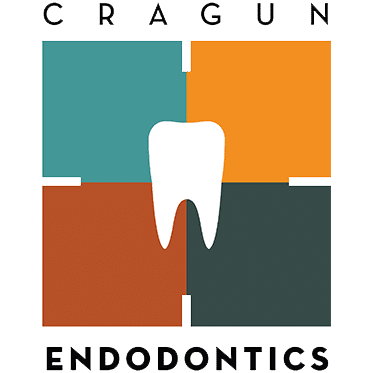Root Canal Treatment in Frisco
Cragun Endodontics performs root canal treatment in Frisco, TX. Call 469-579-4201 to learn more or to schedule an appointment.
What Is a Root Canal?
When you look past the white enamel of the tooth and the hard layer of dentin, you come to an area of soft tissue referred to as the pulp. This area is filled with nerves, blood vessels, and tissue - and it makes up the entire inside of the tooth all the way down to the root.
During a root canal procedure, the endodontist will almost always remove the pulp that is infected or inflamed. (Don’t worry - the pulp’s purpose is to aid in development and isn’t needed once that is done). As soon as the pulp is out of the way, the tiny areas within the root canal are cleaned of infection and then treated. The tooth will be sealed with a temporary solution until restoration begins.
Because the inner part of the tooth is being removed, the integrity of the tooth may be jeopardized. Placing a crown over the tooth is usually recommended to allow the tooth to return to a level of normal functionality.
Signs a Root Canal May Be Needed
The signs and symptoms of an infected tooth that may need a root canal will vary from one individual to the next and based on its severity. Below you will find a few of the most common:
- Constant toothache or pain. This pain can range from mild to severe and doesn’t have to be due to an outside irritant.
- Sensitivity. A tooth in need of a root canal may be sensitive to hot or cold foods/beverages - especially if it lingers after the food/beverage is removed.
- Swelling of the gums. Any swelling around the tooth is a sign that infection may be present in the pulp. This includes not only swollen gums but also swollen or firm areas along the jaw bone.
- Pain when chewing. Sometimes pain or aches while chewing can also indicate the need for a root canal.
- Discoloration of the tooth. A tooth with a dark discoloration may be due to the pulp being infected and should be examined by your endodontist.
Whether you are experiencing any of these symptoms or something else, you are the best judge of your pain or changes in the way your oral health feels. When something doesn’t feel right or if something feels off, it is best to make an appointment and have a thorough examination done.
Why Choose Cragun Endodontics?
At Cragun Endodontics, we understand that many people have a level of fear and anxiety when they hear the phrase root canal. And we welcome the opportunity to change that. That’s why we work hard to make our patients comfortable and to remove any feelings of unease. We maintain open communication to address your fears and concerns and move forward accordingly. Your root canal needs will always be handled with gentleness and skill that allows the procedure to go very smoothly.
It is also important to note that Dr. Cragun has been Board Certified for over 9 years and is an expert in the field of endodontic care. Root canals may be performed by a general dentist, but if you are looking for a specially-trained, highly-skilled experienced endodontist, then look no further than Cragun Endodontics.
We also offer:
- Top-level care and commitment to our patients and the success of their treatment.
- Honesty and trustworthiness.
- Affordability and financing options.
- State-of-the-art technology in a modern setting.
- Comprehensive endodontic care.
FAQs
How long does a root canal procedure take?
Generally, the root canal procedure itself should take about 30 - 60 minutes, depending on the severity of the infection. For more complex root canals, it may take 90 minutes.
Does a root canal hurt?
No, a root canal does not hurt. Local anesthesia will be used to thoroughly numb the area before any dental work begins. This will make the procedure itself painless. Recovery from a root canal is rather fast. Everyone heals differently, but most experience mild symptoms of a ‘bruised tooth” for a few days to a week. This can be relieved with over-the-counter pain medication. In about 5% of the cases, a severe inflammatory response can occur causing severe discomfort after a root canal. This is known as a flare-up and will usually require more medications, like antibiotics, steroids, and pain killers to calm this post-op reaction down.
Will I need a crown after the root canal?
Almost always. It is highly advised that you move forward with getting a crown on all posterior teeth after a root canal. Some anterior teeth may not require a crown. Removing the pulp and clearing out the infection and decay can leave a fairly large hole in the middle of the tooth. This can jeopardize the integrity of the tooth. You will receive a temporary sealant when the root canal is complete, but a second appointment for a crown is always recommended to restore the tooth to its full functionality.
Can I eat after a root canal?
Because the area needs to heal and may still be a little sensitive, it is advised that you eat soft foods and stay away from those that are hot or cold for the first couple of days following your root canal. Until you have a crown in place, avoid eating anything crunchy on the root canal side as it can damage your tooth.
What happens if I don’t get a root canal?
A root canal is needed because the infection has already spread to the pulp of the tooth. If it is left untreated, the infection will continue to spread and can move into the gums and jawbone.
If you would like to learn more or are ready to schedule an appointment, call 469-579-4201.
